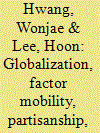| Srl | Item |
| 1 |
ID:
146715


|
|
|
|
|
| Contents |
This paper dissects the current global economic crisis and its causes and consequences in the Americas and Europe. It notes that from the beginning of the present century onwards, the left wing governments that were elected in much of South America improved the lot of the poorest sections of society but did not curb the power of the entrenched business elites and landowning oligarchies in a context of economic decline and malaise. The dysfunctional democratic system of Brazil and the influence of the reactionary upper classes served by the media and supported by neoconservative Pentecostal evangelist churches, led to the overthrow of President Dilma Rousseff in a soft coup aiming to restore fiscal austerity and liberal economic policies.
|
|
|
|
|
|
|
|
|
|
|
|
|
|
|
|
| 2 |
ID:
131001


|
|
|
|
|
| Publication |
2014.
|
| Summary/Abstract |
This paper examines the relationship between economic globalization, factor mobility, government partisanship, and the relative budgetary salience of two different instruments of compensation policies: social welfare spending and industrial subsidy provision. While welfare spending directly benefits labor, industrial subsidies benefit both capital owners and labor along the sectoral line. Based on both factoral and sectoral models of trade, we theoretically argue and empirically show that governments are more likely to use welfare politics as compensation policies if free trade generates class-based interests in the society, and subsidy politics if trade openness promotes industry-based interests. We also argue that the interactions of the three variables are contingent on government partisanship. When non-class-based interests are salient as a consequence of trade openness, left-wing governments are likely to focus on welfare politics while right-wing governments favor provision of subsidies. However, when class-based interests are salient, even right-wing governments behave similarly to left-wing governments, favoring welfare spending over subsidies as the key compensation policy. In the analysis of compensation policies in the OECD countries between 1980 and 2001, the test results confirm our expectation
|
|
|
|
|
|
|
|
|
|
|
|
|
|
|
|